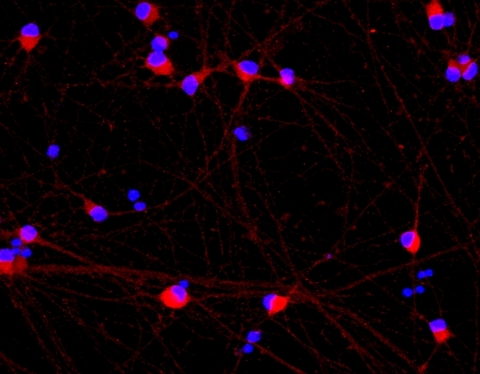
CAMBRIDGE, England– bit.bio, a synthetic biology company working on developing and providing every human cell type at scale, with the aim of transforming the research and medicine landscape, today launch their ioGlutamatergic Neurons HTT50CAG/WT cells to advance research and accelerate drug discovery for Huntington’s disease. This disease model, one of the first of its kind to be commercially available, accurately reflects the genetics of the disease.
This is the pioneer product from bit.bio’s new ioDisease Model portfolio, a range of cells which have specific disease-associated mutations, that can replicate human diseases in vitro and can be matched to an isogenic wild type control. The cells are induced pluripotent stem cell (iPSC)-derived, generated using bit.bio’s opti-oxTM1 precision cellular reprogramming technology in combination with CRISPR/Cas9-based gene editing.
Huntington’s disease is an inherited neurodegenerative condition that affects approximately 5 to 10 out of every 100,000 people2. It is caused by specific mutations in the huntingtin gene, specifically ≥ 40 repeats of a ‘CAG’ DNA sequence. The mutation negatively impacts a range of neuronal cells in the brain, resulting in irreversible damage.
There is no known cure for Huntington’s disease, and the precise underlying mechanisms remain poorly understood. There are limited treatment options for patients that only minimise the impact of symptoms. Until now, it has been difficult for scientists to engineer the specific disease-causing mutation in cells. Having the right disease model can facilitate the study of potential mechanisms and identify therapeutic approaches.
By introducing a stable 50 ‘CAG’ repeat mutation in the Huntingtin gene in wild type ioGlutamatergic Neurons, bit.bio have developed a consistent, scalable cell model that replicates the disease in vitro. Their ability to rapidly mature to glutamatergic neurons, along with their unprecedented scalability and batch-to-batch reproducibility, also makes them ideally suited to high-throughput screening applications.
Using ioGlutamatergic Neurons HTT50CAG/WT and wild type ioGlutamatergic Neurons (that do not possess the mutation) in drug discovery allows the life science community to study the effects of novel treatments in a disease-relevant system with a genetically matched control. Being able to compare data from the disease cell model to those of the genetically matched control offers the potential to identify and investigate the effects of the CAG trinucleotide repeat expansion.
Dr Mark Kotter, CEO and Founder at bit.bio, said: “bit.bio’s mission is coding cells for novel cures. The launch of our Huntington’s disease model provides the industry with an advanced cellular tool to support the study of a devastating condition with high unmet clinical needs. Our opti-ox technology allows the development of consistent and scalable biological standards that can support the evolution of a new generation of medicines. It adds depth to our broadening R&D cell type product pipeline, each product will transition to its own product line.”
Dr Farah Patell-Socha, VP Research Products, at bit.bio, said: “ioGlutamatergic Neurons HTT 50CAG/WT is the first in a series of neurodegenerative disease models being launched by bit.bio, providing a reliable, commercially available source of consistent and scalable cells. By offering more physiologically relevant disease mutations, the disease model portfolio has the potential to help address current gaps facing the successful translation of research into the clinic, crucially by providing isogenic cell models we are delivering a solution that has the potential to boost drug discovery and development.”
bit.bio’s precision cellular reprogramming technology, opti-ox, enables the controlled reprogramming of entire cultures of stem cells into any cell type. This overcomes the inherent limitations of classical cell generation methods and allows the reproducible production of human cells within days, at an industrial scale.

